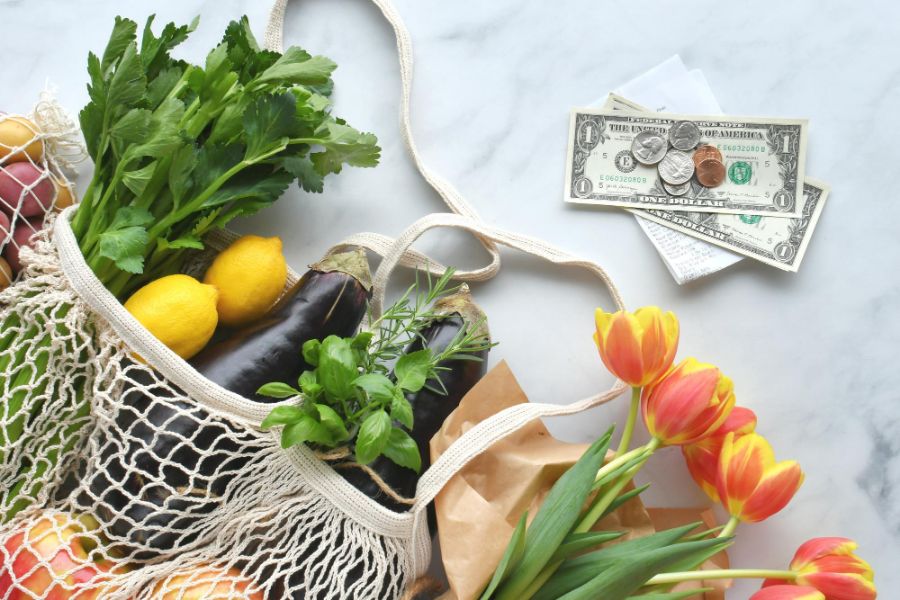With increasing prices of all food items, it's really hard to satisfy your appetite while maintaining an effective budget. You may have tried reducing your expenses, but instead, you start overspending. And this is exactly what happens when you fall behind trying to balance your budget and necessities. However, following these five tips and ways, you can shop for groceries even when you are on a tight budget. So, let's dig in….
1. Buy Groceries in Bulk from Warehouse Stores
Buying in bulk is undoubtedly a great way to save money on groceries, especially if you are on a tight budget. This may include purchasing non-perishable products like powdered milk, pulses, rice, wheat, oats, cereals, teas, honey, beans, butter, and all food items stored for a long time and regularly used in your home.
You may also apply this money-saving strategy to household necessities like detergent, washing powder, dishwashing soap, etc. Here are some things you should certainly know about buying groceries in bulk.
Sale Cycles and Promotional Prices
There are plenty of savings and promotional deals in the "sale Cycle Seasons" in warehouse stores for household products that can help you save hundreds of dollars every month. Like buying three soaps, getting one free, a small detergent pack free with a big washing powder packet, and many more. Consequently, buying groceries in these seasons can help you get enough items for the next 6 to 8 months and saves considerable sums of money.
You Might Get Scammed for Prices
You may end up buying a big pack of ketchup that is more expensive than smaller packets in terms of quantity. Or you may purchase products in larger quantities than needed, and they go to waste. Or your family might be consuming that Greek yogurt three times a day just because you bought the bulk of it, and now you have run out of your whole month's stock in one week. Therefore, plan carefully, compare the prices, know your needs, and then buy groceries in bulk.
2. Spend Less on Ready-Made Food
The comfort that comes with ready-made meals is great until and unless you are tight on your budget and planning to save money on groceries. Subsequently, you pay additional charges for ready-made meals because someone prepares them for you. And you just have to put a quarter of the effort into them compared to a whole meal.
But is the meal you are buying actually worth the price you are paying? And the answer will be yes if you are a super-busy person or billionaire. But let's have a look at the other side of the story.
It Serves Fewer People at Higher Rates
The price of the ready-made is lower than buying raw ingredients and preparing the meal. But what about the fact that these meals only serve one or two people? Not only do you get a few servings from ready-made food, but you also miss a chance to save and use ingredients in the long run. Therefore, making your food helps you build a stock of groceries and more servings per meal.
Full of Chemicals Having Damaging Effects on Health
Not forgetting that these pre-made meals have preservatives, sugar, and hundreds of additional chemicals that can affect your health. They are also low in nutritional content, high in fats, and come with the label of additional flavorings. And you never know what exactly you are getting in your dinner.
So, instead of spending half of your monthly budget on ready-made food and risking the lives of your family. With serious health problems like obesity, weak bones, and cardiovascular issues. Therefore, stop roaming around the refrigerators aisle of the superstore and spend money on raw products. That helps you save more money while making your lifestyle even healthier.
3. Plan Your Budget and Your Groceries
Have you ever been shopping and ended up buying irrelevant and unnecessary stuff? Yes? This is precisely what makes you overspend on groceries and empty your pockets. Making a grocery list before shopping is another important step for saving money on groceries. It not only helps you avoid overspending but also directs your focus on critical and essential stuff. So you don't get distracted by fancy and unnecessary products.
On the contrary, the variety of brands and products with attention-grabbing packaging may overwhelm you. And you buy many items that are not even close to your necessities. However, you can overcome the attractive product advertisements in supermarkets with prior planning and decisions.
Make a Basic List of Groceries
Start by making a list of high-priority products and then adding less important products to the last of the grocery list. It helps you focus on the grocery list and stops your mind from being distracted by other items.
Reduces Impulse of Urgency for Buying Other Products
By having a list of the least used and less important products, you won't have the impulse to urgency. And you'll not end up buying the products that are not on your list while enjoying useful products and maintaining a steady budget.
Preparation of Budget for Groceries
After preparing a list, do not forget to design a grocery budget, as your budget needs to be controlled. For this, add the price of the big or bulk food products you will be buying and then add an average budget for the rest of the items. Also, leave some space for snacks, chips, chocolates, and biscuits. Be easy on yourself; otherwise, you may buy things entirely out of the budget.
However, you can also practice money-saving tips to empower yourself with more savings to enjoy an endless shopping experience.
4. Avoid Using Your Debit/Credit Cards
This sounds strange to you. But using cash instead of your debit/credit helps in multiple ways. It prevents you from buying items not on your grocery list and forces you to stay within your budget. So, you can make your list, plan your budget, and take the cash with you to the supermarket for your monthly grocery shopping.
- You may take support from credit cards to avoid the embarrassment of being short on money at the checkout. This gives you no choice except to buy everything you picked in your cart. Therefore, a preplanned grocery list and cash on hand save you from spending more and facing embarrassment.
- Your debit/credit card contains all your salaries, savings, or your complete monthly budget, from utility bills to children's fees, car maintenance, and many more. You may unbalance your financial stability if you pay through your credit/debit card for groceries. And just a few extra things you buy from supermarkets can disturb your whole monthly expense cycle.
- It also helps you avoid being influenced by the small psychological tricks supermarkets do for their customers.
So, always carry cash when grocery shopping to restrict yourself from overspending on unnecessary stuff and staying within your budget.
5. Don't Run After Brands
You may believe in the quality and reliability of famous brands of cereals, drinks, clothes, beauty products, or kitchen supplies. Even if their prices are higher than average, you would still love to buy them, trusting their popularity. However, in supermarkets, you might have seen many unpopular brands of products that you don't buy.
Even if their prices are lower, you would still not buy them. It's only because you trust big brands and invest your money buying their products. But buying products from small businesses also has many positive impacts when you are on a tight budget. It helps you follow your monthly budget while also getting quality products.
Small Brands are Cheaper
The famous "Name" of the re-owned brands is about all “higher prices”. Although they provide high-quality products, their primary focus is maintaining brand popularity. This leads to more expensive items than other brands on the market. And people feel intrigued to try things from them without a second thought. Thus, if you are on a tight budget, it's better to try buying stuff from small brands while still getting the most quality products.
So Far No Taste and Quality Differences
Besides being inexpensive, small businesses and unpopular brands offer the same taste and quality in their products. So, the myth that only big brands offer outclass flavors to your taste buds may burst here. However, not all small brands will provide you with the promised quality. Therefore, always research before you buy anything and ensure the brand you choose has relevant feedback and a reasonable ratio of likeness among customers.
Let's Enjoy More While Staying Tight on a Budget
Saving money on groceries while standing in the middle of shopping in the supermarket seems unreal. Especially when every other spice seems essential in your kitchen, you feel frustrated, right? But you'll note a significant difference by implementing the right strategies, from bulk purchasing to planning your budget. And you'll be able to make your life more organized and stress-free while maintaining a healthy lifestyle as well as an effective budget.




